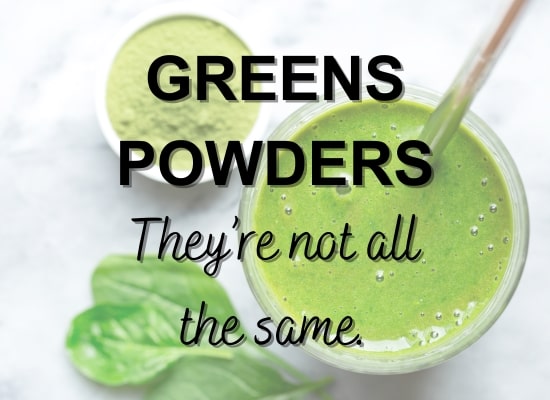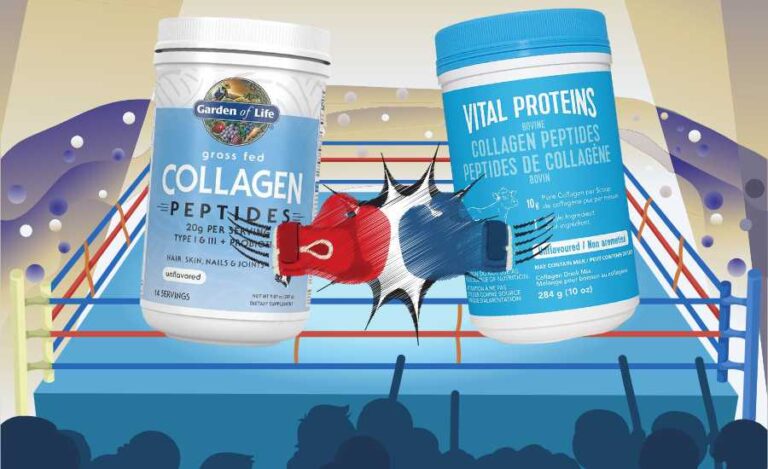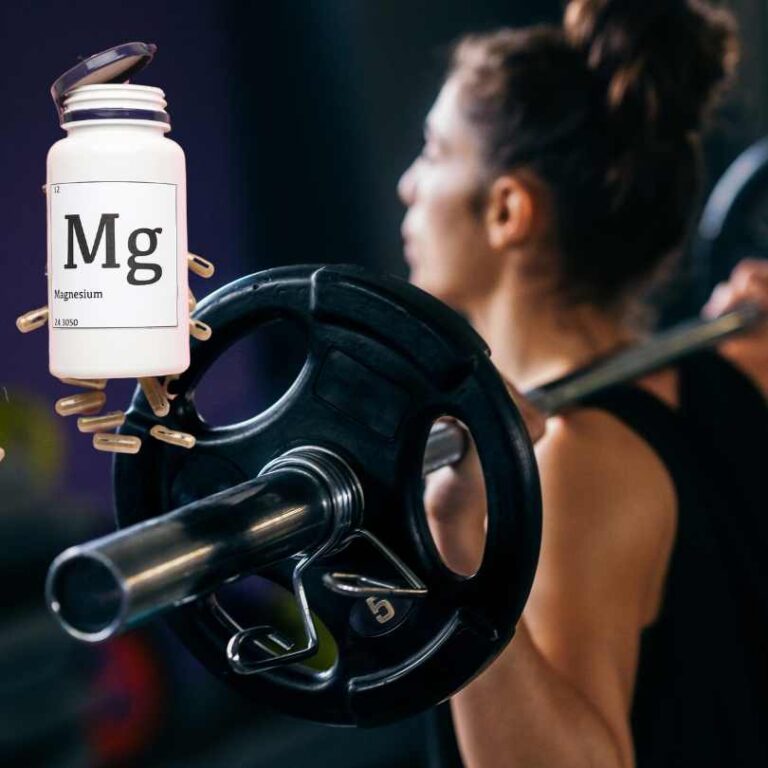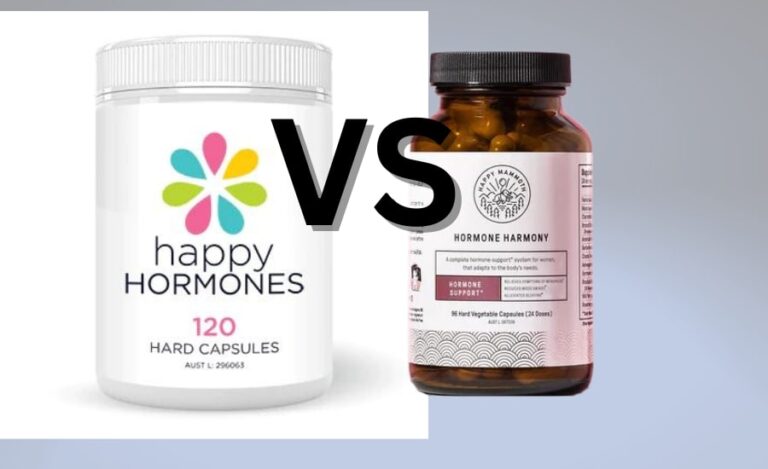Close your eyes and imagine sipping from a cup of liquid vitality, a potion that not only warms your soul but keeps you feeling youthful and vibrant. Ladies, this is the enchantment of bone broth. It’s not just a sip, it’s a step towards timeless wellness. Join me as we unveil the best bone broth Australia has to offer, because staying youthful and healthy comes from within.
Click on each section to go straight to it.
What kind of bone broth should you be looking for?
3 Brands of Best Bone Broth Australia has to offer.
What kind of bone broth is healthiest?
Is bone broth worth the hype?
Is bone broth good for the skin?
Is bone broth good for weight loss?
Is bone broth good for IBS (Irritable Bowel Syndrome)?
Are there any side effects of negatives about drinking bone broth frequently?
Can bone broth be helpful in menopause?
Does bone broth contain essential amino acids?
Is homemade bone broth better than store-bought?
How much bone broth should you drink a day?
What is a bone broth fast and can you lose weight on it?
How to increase protein content in homemade bone broth?
What are the benefits of having high marrow content in the bones for bone broth?
What kind of bone broth should you be looking for?
I know for many of us busy bees, getting enough protein daily can be a struggle. Also getting a good amount of collagen in your bone broth would be a bonus since it has amazing anti-aging benefits. As we age we lose collagen in our body at a much higher rate than when we were younger. Whilst bone broth contains collagen naturally there are some that have more than others and some types are more bioavailable than others.
Different types of collagen in bone broth can have varying degrees of bioavailability. This means that some forms of collagen are more easily absorbed and utilized by the body compared to others. Factors such as processing methods and the source of the collagen can influence its bioavailability. It’s important to consider these factors when choosing a bone broth for maximum health benefits.
Additionally, for those women who are active and work out regularly especially doing intense HIIT workouts or weight training, supporting our joints and bones is even more important so joint pain won’t slow us down.
3 Brands of Best Bone Broth Australia has to offer that are higher in protein than other brands.
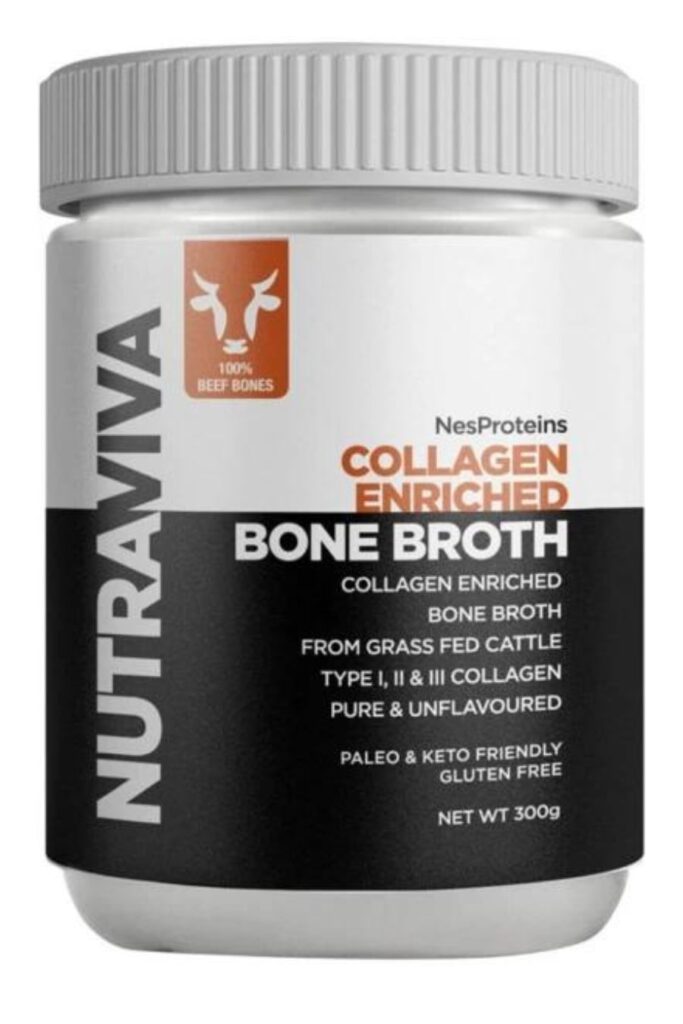
Nutraviva Collagen Enriched Pure Bone Broth. No added sodium.
Ingredients: New Zealand Grass Fed Beef Bone Broth Powders (beef bones, filtered water), grass fed and finished Beef collagen, proprietary beef blend (yeast extract, salt, natural beef flavour).
Taste: mild neutral flavour as it’s low in sodium.
Price: $55-62 for 42 servings (300g container).
Protein content: 6.4g per 7g serving.
Sodium: 69mg (naturally occuring)
Where to buy:
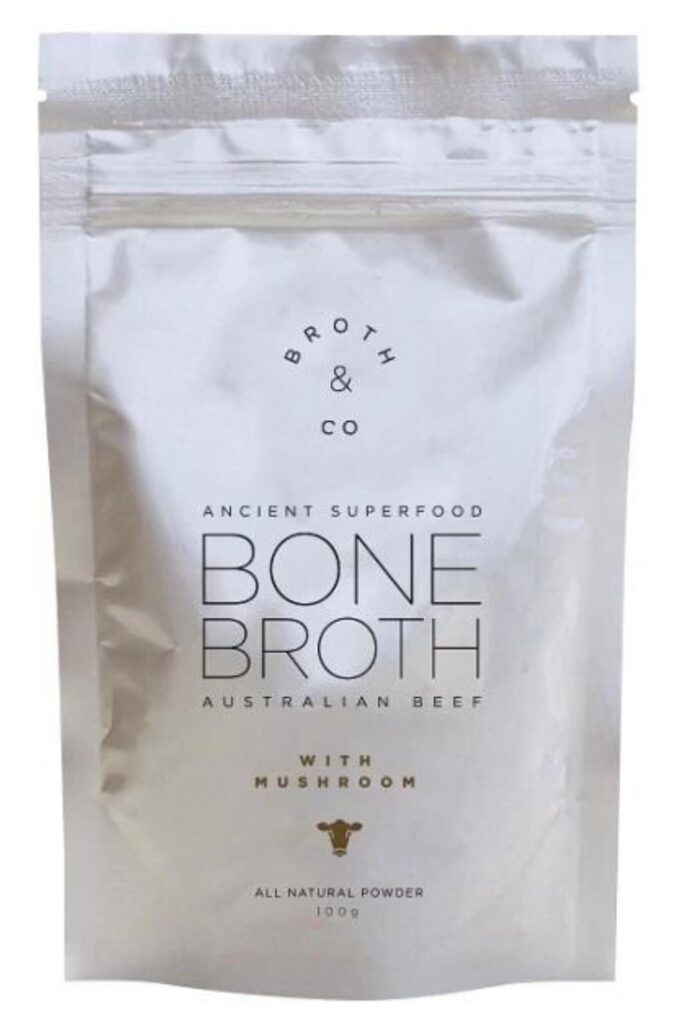
Broth & Co Bone Broth Powder with Murshroom.
Ingredients: Australian Grass-Fed Bone Broth 90%, Mushroom Powder Blend 10% (White, Shiitaki, Agaricus).
Taste: mild neutral flavour as it’s low in sodium with a subtle hint of mushrooms.
Price: $21-25 for 20servings (100g container).
Protein content: 4.4g of 5g serving.
Sodium: 39mg (naturally occurring)
Where to buy:
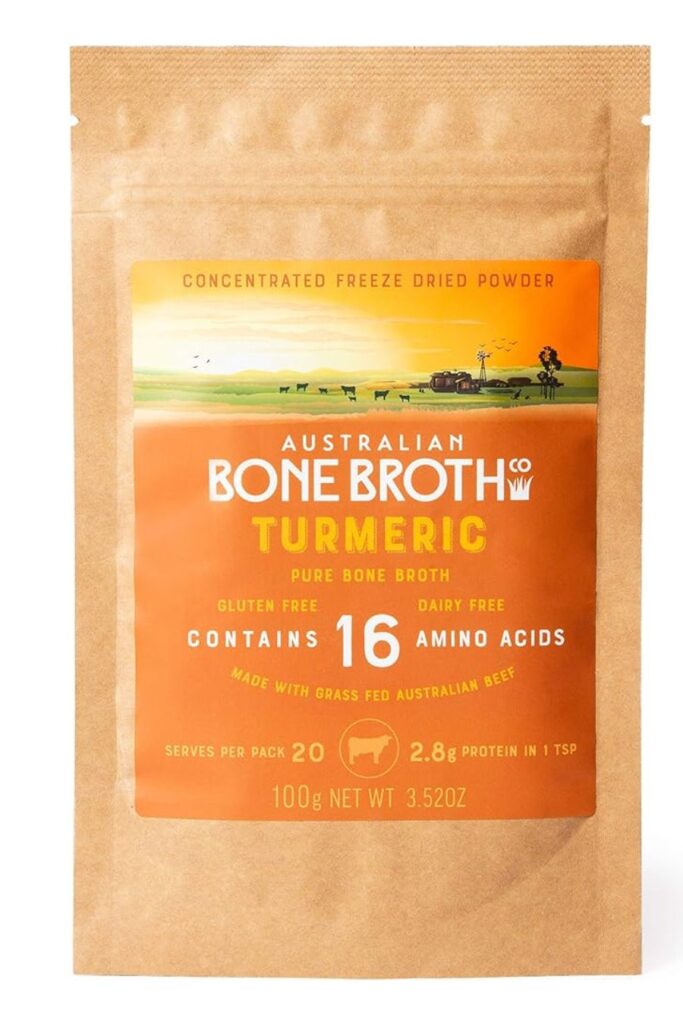
Australian Bone Broth Co, Pure Bone Broth with Turmeric.
Ingredients: 100% Australian Beef Bone Broth Powder (80%) Beef Collagen Peptides, Ground Turmeric, Ginger and Black Pepper.
Taste: More flavoursome and higher sodium content.
Price: $28 for 20servings (100g pouch).
Protein content: 2.8g of 5g serving.
Sodium: 420mg
Where to buy:
What kind of bone broth is healthiest?
The type of bone broth that would be the best is the type that doesn’t contain any additives, artificial colours or flavours, or high amounts of sodium. And as I mentioned above the highest possible protein content for the best nutritional value, as possible.
A natural grass-fed beef bone broth concentrate or powder would be my preferred choice. It is ideal to use a bone broth that has undergone a maximum nutrient extraction process.
Bone broth can be a fantastic base for many soups for the whole family.
Is bone broth worth the hype?
Gelatin, abundant in the amino acids glycine and proline, has been extensively studied by renowned researcher Dr. N.R. Gotthoffer.
His research indicates that adults recovering from surgery, illness, or other conditions show improved outcomes when gelatin is included in their diet. Studies on collagen and gelatin demonstrate enhanced utilisation of many dietary proteins from sources like beans, meat, and dairy.
Collagen found in bone broth plays a crucial role in soft tissue and wound healing, cartilage and bone health, gastrointestinal tract protection, and the absorption of proteins and minerals.
As a health coach, I believe that bone broth can definitely have great impact on our overall health. We know that adequate dietary protein is essential for our body to repair and thrive.
Collagen protein is important for our connective tissue so adding bone broth to our diet daily can help us increase not only our general protein intake, but specifically collagen protein.
What is the difference between general protein and collagen protein?
Protein:
- Building blocks: Made of tiny parts called amino acids.
- Jobs: Does many important tasks in the body like helping with muscles, enzymes, and the immune system.
Collagen Protein:
- Special protein: Is a vital component that works like scaffolding in our body.
- Jobs: Keeps our skin, tendons, bones, and other parts strong and flexible. Helps with healing wounds and keeping joints healthy.
In short, proteins do lots of jobs in the body, while collagen is a special type of protein that makes our body’s structure strong and flexible.
Is bone broth good for the skin?
Here are some of the ways bone broth can be beneficial for skin, particularly maturing skin.
- More Collagen: Collagen is present in our skin as well as being a structural component of cartilage, it helps our skin stay elastic.
- Fewer Wrinkles: Collagen can make your skin smoother and firmer, which means fewer lines and wrinkles.
- Heals Cuts and Scrapes: It helps your skin get better when you have a cut or scrape.
- Protects Your Skin: Bone broth has things that keep your skin strong and safe from things that can hurt it.
- Gives Your Skin Good Stuff: It has vitamins and minerals that are good for your skin.
- Less Redness and Irritation: It can make your skin less red and irritated.
- Keeps Your Skin Moist: It helps keep your skin from getting too dry.
- Might Help with Pimples: Some people say it helps with pimples.
If you would like to find out more about skin health, you can read my latest article on my Skincare Routine for Maturing skin right here.
Is bone broth good for weight loss?
Here is how drinking bone broth daily can help with weight loss.
Keeps You Full: It has protein that makes you feel full, so you eat less.
Not Many Calories: It’s not high in calories, so it’s a great way to help you stay in a deficit.
Steadies Your Blood Sugar: It helps keep your blood sugar levels steady, reducing cravings.
Good for Your Belly: It’s easy on your stomach and can help make your gut healthier.
Has Important Nutrients: It’s full of vitamins and minerals that keep you healthy while you’re losing weight.
Keeps You Hydrated: It helps you stay hydrated, which can prevent overeating.
Might Help Reduce Inflammatory Conditions of the Gastrointestinal Tract: It can help if inflammation is making it hard for you to lose weight.
The important thing to remember is that bone broth alone is not a magic potion for weight loss, it should be a part of a balanced diet that contains other nutrients. Also adding bone broth to an otherwise unhealthy diet will not be very helpful for weight loss. You need to consider overall calorie deficit and bone broth can help you achieve that by helping you feel more satisfied throughout the day.
Is bone broth good for IBS (Irritable Bowel Syndrome)?
Bone broth might help with digestive disorders like IBS in these ways:
Gentle on the Gut: It’s easy to digest and may soothe the digestive tract.
Rich in Good Stuff: It’s packed with nutrients that support digestive health.
Fights Inflammation: It has anti-inflammatory properties, which can ease IBS symptoms and aid the healing process.
Good for Gut Bacteria: It helps keep the balance of good bacteria in your gut.
Remember, what works for one person may not work for another, so it’s a good idea to talk to a healthcare professional or dietitian before making big changes to your diet. They can give you the best advice for your specific needs.
Are there any side effects of negatives about drinking bone broth frequently?
While bone broth is generally considered safe and nutritious, there are a few considerations to keep in mind, especially when consumed frequently or in large quantities:
High Sodium: Watch for large amounts of salt, not ideal for those with high blood pressure or kidney issues. The brands I recommended above a relatively low sodium or some are completely added sodium free – just pure bone broth, so that would not be a concern in this case.
Possible Lead Contamination: Ensure bones are from reliable, quality sources to minimize risk. Or if you are using bone broth product then ensure it comes from a reputable company that conducts 3rd party testing.
Histamine Levels: Slow-cooked broth can be high, potentially causing issues for histamine-sensitive individuals.
Purine Content: Excessive intake may not be suitable for those with gout or kidney stone history.
Mineral Overload: Large quantities could lead to imbalances, particularly with calcium.
Protein Completeness: It may not provide all essential amino acids, so balance with other protein sources.
Consider Medical Conditions: Seek advice if you have specific health concerns or are on medication.
Remember, moderation is key, and if in doubt, consult a healthcare professional or dietitian.
Can bone broth be helpful in menopause?
As we age we lose collagen in our body rapidly, sometimes collagen deficiency can occur. During menopause, bone broth can have a beneficial effect in various ways. Aside from providing us with the anti-aging benefits of collagen for skin and connective tissue, it can also help with the effects of declining estrogen levels. This nutrient-dense elixir also provides essential minerals like calcium, chondroitin sulfate and magnesium, crucial for bone health during this life stage.
Bone broth’s gentle nature on the digestive system soothes potential discomfort, and its hydration properties help combat dehydration, a common concern.
Additionally, the amino acid glycine promotes better sleep quality and mood stability, addressing some of the challenges women may face during menopause.
Overall, incorporating bone broth into a balanced diet can be a natural and nourishing way to navigate the changes that come with this life transition.
Does bone broth contain essential amino acids?
Amino acids are the building blocks of proteins, and there are nine amino acids that the human body cannot produce on its own, which are referred to as essential amino acids. These essential amino acids need to be obtained from the diet.
Bone broth is a good source of amino acid-rich living gelatin adding to the nutritional benefits of bone broth.
- Histidine
- Isoleucine
- Leucine
- Lysine
- Methionine
- Phenylalanine
- Threonine
- Tryptophan
- Valine
By consuming bone broth, you’re providing your body with these essential amino acids, which play crucial roles in various physiological processes such as protein synthesis, immune function, and enzyme production.
Is homemade bone broth better than store-bought?
Everything homemade is always best, however here are a few reasons why I love having some good quality powdered bone broth on hand.
Convenience: Clearly preparing homemade bone broth takes a lot of time and effort, if you are time-poor like me that might not be the best option.
Knowing your macros: With bought bone broth you will know for sure how much protein in contains as it will be clearly labeled on the packet or jar, if you are tracking your protein intake, it will make it much easier and more accurate.
Consistency: Most people won’t commit to weekly bone broth preparation. Having some ready-to-go broth powder will ensure you can have it daily, helping you stay consistent in protein and collagen intake.
How much bone broth should you drink a day?
When bone broth is in supplement form, such as a powder or capsule, it is typically more concentrated than when it’s consumed as a liquid. The recommended dosage can vary depending on the specific product and its formulation. It’s important to follow the manufacturer’s instructions and recommended serving size provided on the product’s label or packaging.
As long as bone broth isn’t too high in sodium it’s considered safe to have multiple times per day.
What is a bone broth fast and can you lose weight on it?
Well, it’s not really a true fast because you are still consuming some nutrients, which is a good thing. Personally, as a health and fitness coach, I would prefer this for my clients over just water fast. At least I know they would be getting some form of nutrients and protein during that time.
Although bone broth fast is a popular way to lose weight, most dietitians would not recommend doing it for long periods of time as bone broth is not a complete source of nutrients that your body needs daily.
Positives of bone broth fast:
- Easy to stay in a caloric deficit to speed up weight loss
- Will give you protein and some other nutrients to keep you more satisfied than you would on water fast
- Will help you stay hydrated
Negatives of bone broth fast:
- Not a complete source of nutrients for the body, lacking a lot of vitamins and minerals. You can increase your nutrient intake during the fast by adding some greens powder made of organic vegetables and fruits for fibre and prebiotics.
- Lacks fibre to keep a healthy digestion
- Usually not recommended to do for more than 3 days at a time
How to increase protein content in homemade bone broth?
To increase the protein content in homemade bone broth try following these tips:
Use Protein-Rich Bones: Choose bones that are naturally higher in protein. This includes bones with some meat attached, such as chicken thighs or beef shanks.
Include Meaty Cuts: Adding cuts of meat along with the bones can significantly boost the protein content. For example, using chicken thighs or beef cuts with some fat and muscle tissue will increase the protein.
Simmer for a Longer Time: Long cooking time ensure maximum protein extraction. Aim for a minimum of 12-24 hours for maximum protein extraction.
Add Extra Protein Sources: You can supplement your bone broth with additional protein sources like collagen powder or protein-rich vegetables like spinach or kale.
Reduce Water Content: If you’re aiming for a more concentrated broth, use less water. This will result in a broth with a higher protein concentration.
Skim the Fat: While this won’t increase the overall protein content, removing some of the fat can make the protein more concentrated.
Use a Variety of Bones: Combining different types of bones, such as those with marrow, joint bones, and meaty bones, can provide a more diverse nutrient profile, including protein.
Remember, while these methods can increase the protein content of your bone broth, it’s still important to note that bone broth is not a primary source of protein compared to meats, fish, legumes, and dairy products. It’s valuable for its collagen, minerals, and other nutrients, but for high protein intake, it’s best to incorporate a variety of protein-rich foods into your diet.
What are the benefits of having high marrow content in the bones for bone broth?
Having more bone marrow in the bones used for making bone broth can enhance the flavor, richness, and nutritional profile of the broth. Here are some benefits:
Flavor and Richness:
- Bone marrow is known for its rich, savory flavor. It imparts a deep, umami taste to the broth, making it more satisfying and flavorful.
Nutrient Density:
- Bone marrow is a nutrient-dense component of bones. It’s particularly rich in healthy fats, vitamins (such as A and K2), and minerals like iron, zinc, and selenium.
Collagen and Gelatin Content:
- While the primary source of collagen and gelatin in bone broth comes from connective tissues and cartilage, bone marrow can contribute additional collagen, which provides structural support and is beneficial for joint health, skin, and gut health.
Anti-Inflammatory Properties:
- The healthy fats found in bone marrow, such as monounsaturated and omega-3 essential fatty acids. Healthy essential fats have anti-inflammatory properties, which can contribute to overall health and well-being.
Boosted Immunity:
- Marrow contains important immune-supporting nutrients like zinc and selenium. These can help strengthen the immune system.
Improved Bone Health:
- Marrow is rich in nutrients essential for bone health, including calcium, phosphorus, and magnesium. These minerals contribute to strong and healthy bones.
Gut Health:
- The gelatin produced during the cooking process, which can come from both the connective tissues and bone marrow, is beneficial for gut health. It supports the lining of the digestive tract.
Satiety and Nourishment:
- The fats and nutrients from bone marrow add an extra layer of satiety and nourishment to the broth, making it more satisfying and providing a source of sustained energy.
Remember, when using bones with marrow, it’s best to use bones from healthy, pasture-raised animals to ensure marrow’s immune-boosting capabilities. Additionally, roasting or searing the bones before making the broth can enhance the flavor and richness even further.
If you found this article helpful, please drop me a comment below and let me know if you already incorporating some bone broth in your diet daily or considering trying it.
Disclaimer: This article is not nutrition advice, please consult your health care professional or dietitian before making any changes to your diet or adding supplements.

